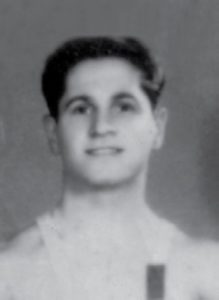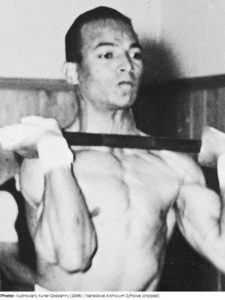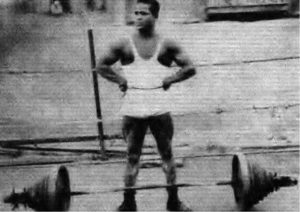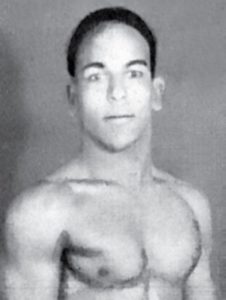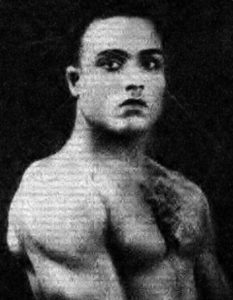Today we bring you Part 3 of our attempt to clarify the biographical details of the lives of Egypt’s Olympic medalists and are focusing on the 1948 Summer Games. In terms of medal count, this was Egypt’s most successful appearance and, while records were getting better, there still remains some mystery about the medalists from these Games.
Mahmoud Fayad – Olympic Champion in Featherweight Weightlifting: With Ibrahim Shams having moved up a weight category and Saleh Mohamed Soliman having seemingly disappeared from the sporting scene, the two pre-war Egyptian medalists in Olympic featherweight weightlifting were out of contention for the1948 Games. This set the stage for Mahmoud Fayad to triumph in the event and establish his legacy among Egypt’s great champions. A World silver medalist in 1946, he went on to become World Champion in 1949 and 1950, leading to numerous works being written about him. They all agree that he was born March 9, 1925 in Alexandria, while his obituary in Al-Ahram confirms that he died there on December 18, 2002, making him one of the few Egyptian Olympic medalists for whom data is consistent and reliable.
Ibrahim Shams – Olympic Champion in Lightweight Weightlifting: We mentioned last week that Ibrahim Shams took bronze in the featherweight weightlifting tournament at the 1936 Games but, during World War II, he moved up in weight category with great success, as he captured the Olympic lightweight title in 1948. As we mentioned above, we are still trying to determine which (if either) of his birth or death dates was January 15 instead of 16 but, for the most part, information on his life is as consistent as it is with Fayad.
Attia Mohammed – Silver medalist in Lightweight Weightlifting: History has not been as kind, however, to the runner-up to Shams’ victory, Attia Mohammed, another Olympic medalist whose very used name could be the subject of debate. His full name was Attia Mohammed Hamouda, but what he actually went by varies from source to source and tournament to tournament, although “Attia Mohammed” seems most common in Arabic-language materials, although very little was written about him overall. His year of birth (we have no exact date) is seen as both 1914 and 1922, but pictures of him in sporting magazines of the early 1930s demonstrate that the latter is impossible (the one above, for example, comes from a 1934 publication). As for his year of death, the Egyptian Olympic Committee (EOC) gives 1992, but we have seen no other source to collaborate this, and the lack of an exact date makes it difficult to search for him in the Al-Ahram archives. Thus we continue to seek confirmation.
Mahmoud Hassan – Silver medalist in Bantamweight Greco-Roman Wrestling: Mahmoud Hassan was the 1947 bantamweight Greco-Roman World Champion, but he had to settle for silver in that category at the 1948 Summer Olympics. At the 1951 Mediterranean Games, however, he took the gold medal once again. Most sources have him born December 15, 1919 and dying September 10, 1998, but we were unable to verify the latter date in Al-Ahram. While we have no reason to doubt this date, it would be nice to obtain some additional confirmation.
Ibrahim Orabi – Bronze medalist in Light-Heavyweight Greco-Roman Wrestling: Only by virtue of his longer and more noted career does Ibrahim Orabi surrender the title of Egypt’s most enigmatic Olympic medalist to Saleh Mohamed Soliman. The EOC lists virtually nothing about him, other than that he won a bronze medal in light-heavyweight Greco-Roman wrestling at the 1948 Games. We also know that he competed as a middleweight at the 1936 edition, where he placed fifth, and won a light-heavyweight silver medal at the 1951 Mediterranean Games. Aside from this, contemporary reports list him as being from Alexandria, and we have no reason to doubt the year of birth of 1912 that we often see ascribed to him. After 1951, he seems to disappear from the historical records and, given that it is highly unlikely (albeit not impossible) that he is still alive, we have been unable to locate any information on the circumstances surrounding his death.
Next week we will be wrapping up this series by looking at Egypt’s medalists from the 1952 and 1960 Olympics, as the nation only saw the podium once more – in 1984 – between 1960 and 2004. We will also finish our survey with a few concluding remarks, before moving on to new topics beginning two weeks from now.
